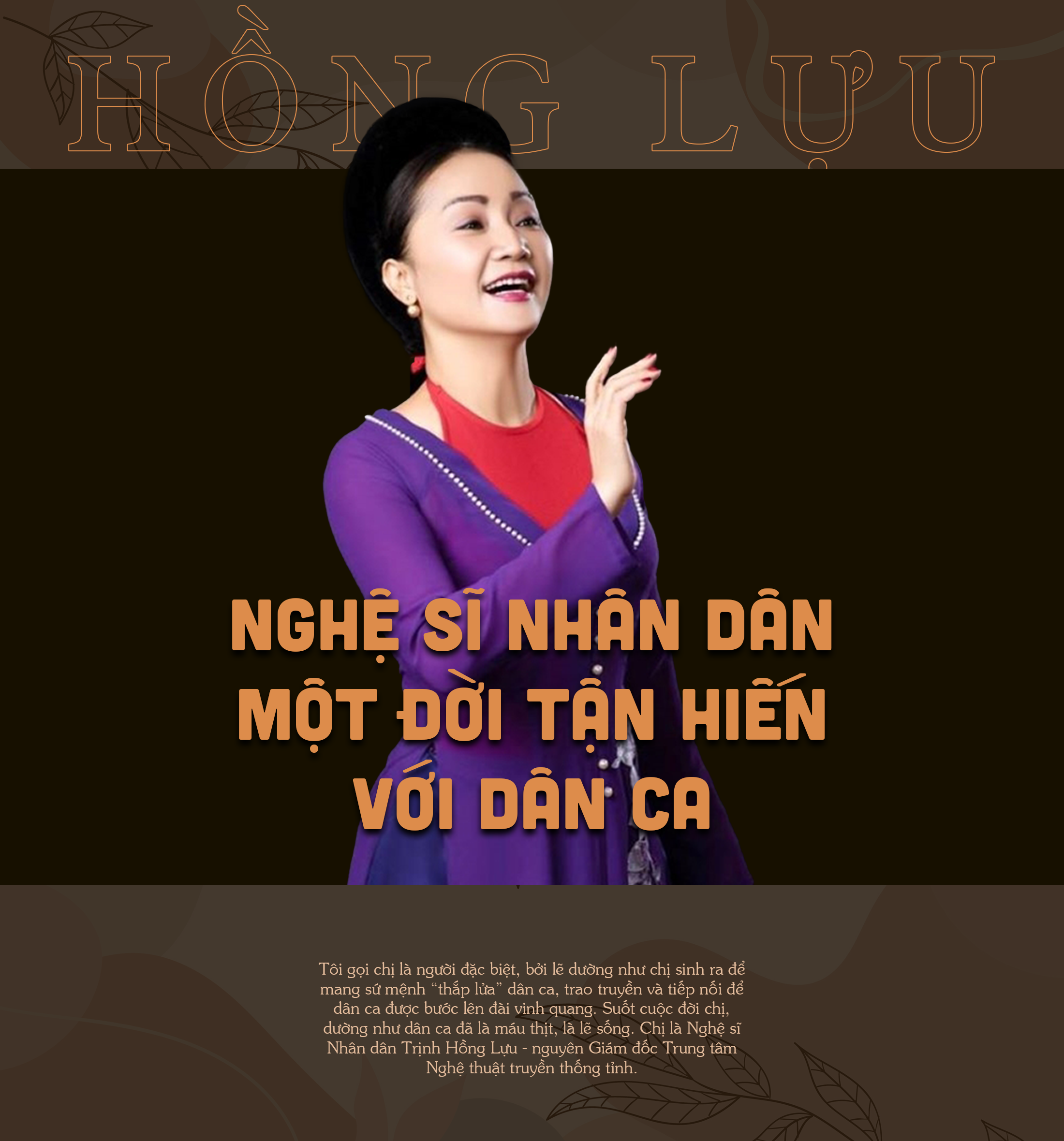

Trinh Hong Luu said that she was born into a family of 7 siblings in Thanh Ha commune, Thanh Chuong district, but she was the only one who showed her singing talent early on. When she was only 3-4 years old, little Luu stood in the cooperative yard and sang sweet Vi and Bai Giam melodies, making everyone happy and amazed. When she grew up, her father composed Vi lyrics from poems about the small planning movement so that she had material to sing. Although she was not born into a family with a musical tradition, the "artistic" quality still secretly flowed somewhere in the veins of her parents, and then crystallized into a Hong Luu who devoted her life to folk songs.
In her hometown Thanh Ha, Trinh Hong Luu was known as the "artist" of the village, neighborhood and school. Wherever she was, there was a lively singing movement. Every time Hong Luu appeared on stage, there was a round of applause. At the age of 14-15, many professional troupes of the province went to recruit actors, she happily registered and was accepted into all troupes, from the White Lotus Cai Luong Troupe to the Song, Dance and Drama Troupe; Nghe An Folk Song Troupe, Military Region 4 Art Troupe... However, her mother, a woman with a vision of the times, did not let her join the troupe right away, she wanted her daughter to finish high school, have a solid foundation of knowledge before "entering the profession".

Trinh Hong Luu officially joined the Nghe An Folk Song Troupe in 1985. At the troupe, she was able to participate in artistic activities with a generation of famous actors at that time, and was quickly noticed for her acting ability and fiery singing voice. She was sent to study at the Nghe An School of Culture and Arts, and at the same time, took on roles to test her talent.
The strange thing is that in any play, she knows all the lines from the supporting actor to the main actor. Hong Luu said, remembering lines is not only because of the desire to learn but also because of passion. If you have passion, everything will come. She thought so and one day, when actress Linh Quang, who played the role of Princess Bich Chau in the play "Storm of Ky Hoa Gate", retired, artist Hoa Ban, the professional leader of the troupe at that time, assigned this role to her. Like a fish in water, she played this role after only one rehearsal. Everyone was surprised by the acting of the girl who had just joined the troupe, and even more impressed when Hong Luu performed the psychologically torn scenes very sharply. There were times when the troupe was short of many roles, she had just finished performing one role and quickly put on makeup to play another. It was her quick transformation and natural talent in singing and captivating acting that made the troupe trust and assign many main roles to Hong Luu.
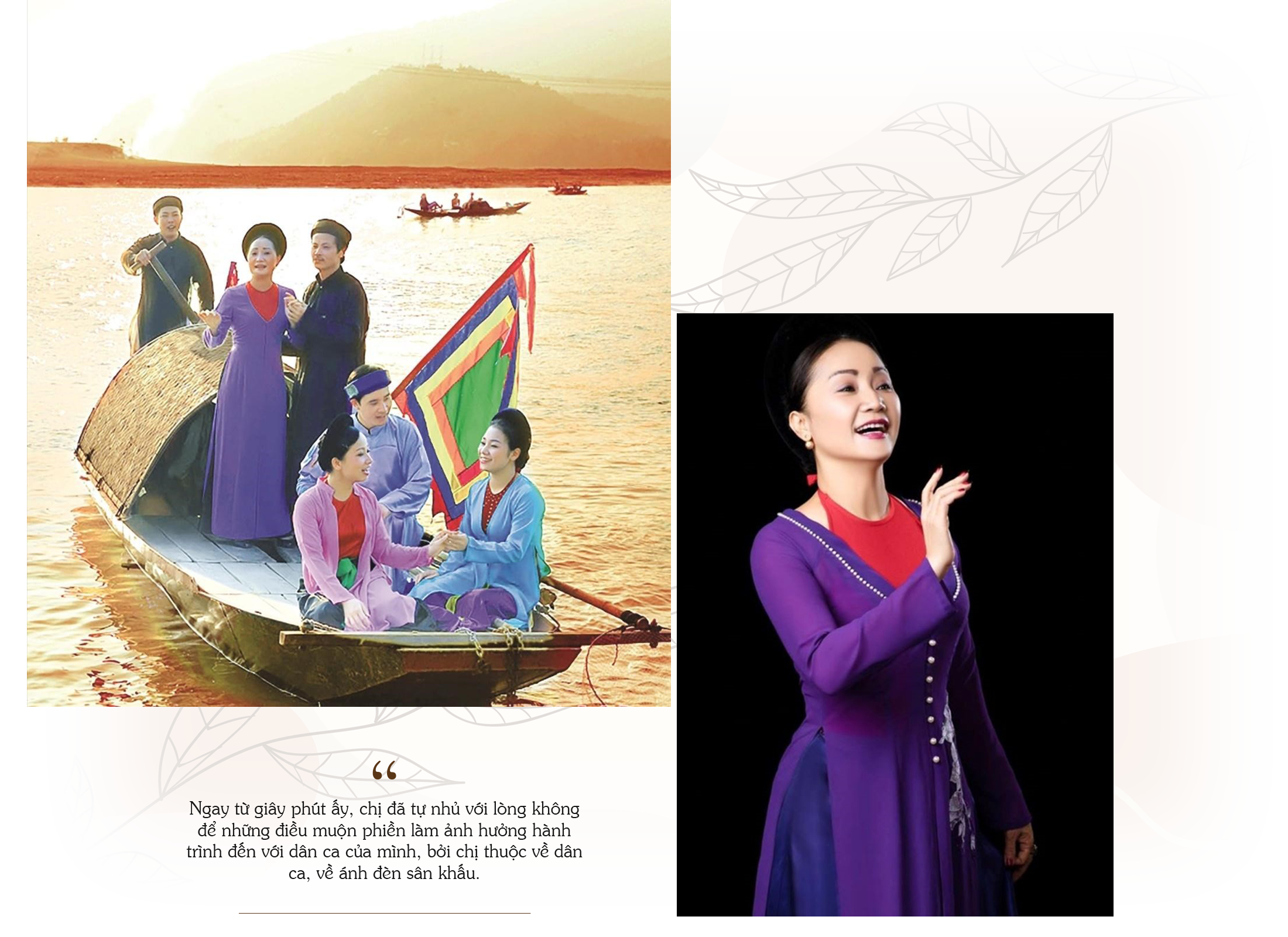
It was thought that for Hong Luu, the path of professional folk music and drama was only strewn with roses thanks to talent and effort, but few people know that the artist had to face many difficulties and step on thousands of thorns. Hong Luu had to endure many challenges because of shallow people's hearts, jealousy, envy, and jealousy. There were times when she could not stand firm, she had chosen other paths, but then because she loved her profession so much and also because of the call of love for her co-star, future life partner, Meritorious Artist An Ninh, she returned to Nghe An Folk Music Theater in the joy of those who loved and supported her. From that moment on, she told herself not to let the troubles affect her journey to folk music, because she belonged to folk music, to the stage lights.
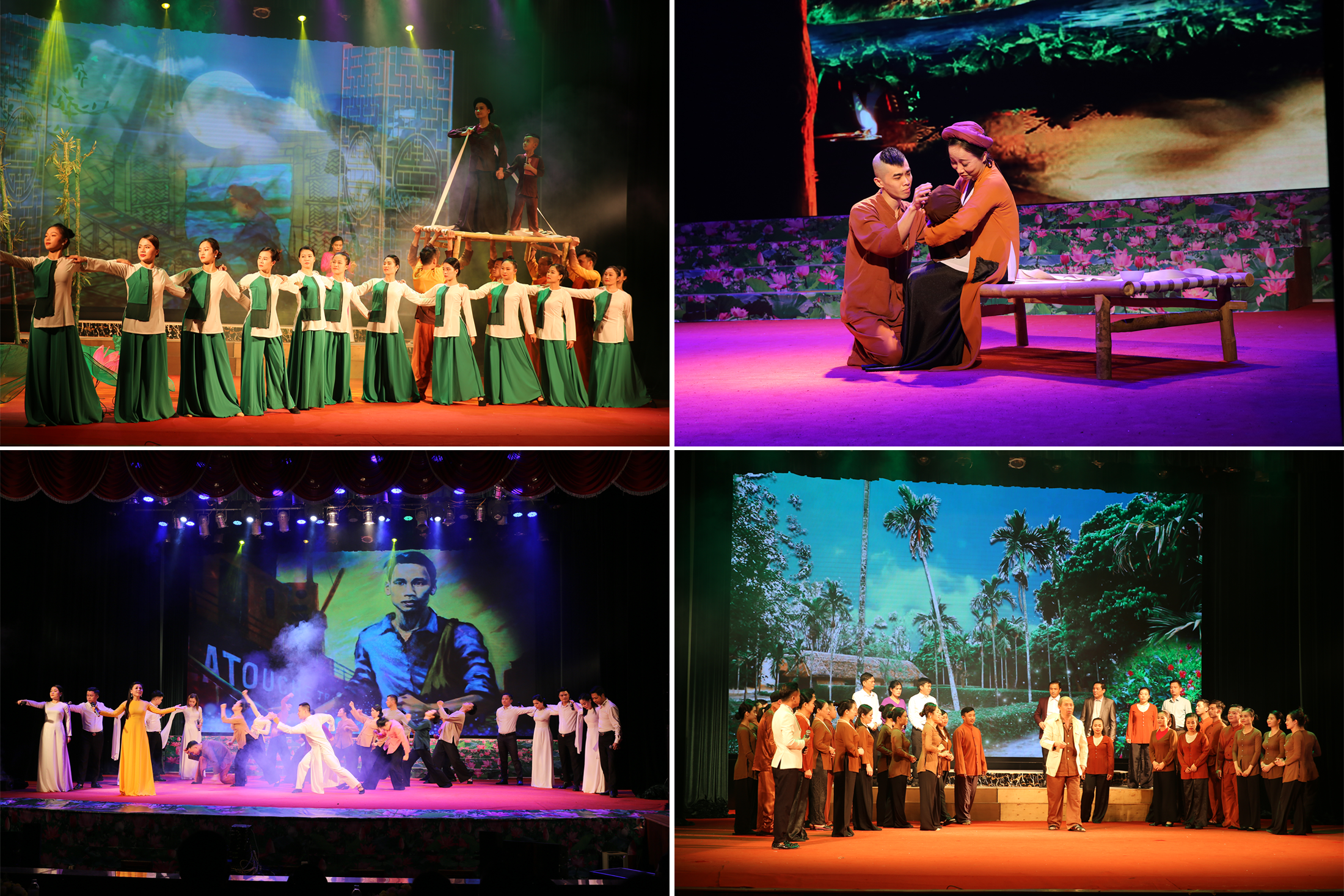
From then on, Hong Luu could only move forward on the path that she had explored and worked hard to gain a foothold for herself. There were glorious periods but also bitter and difficult ones. She remembered exactly the time when she had just given birth to her first child, who was only 2 months old. The theater leadership sent a car to take both mother and child to perform, even though the play was only missing a supporting role. Or when she had just given birth to her second child, who was just over a month old, she had to perform the role of mother Hoang Thi Loan because only Hong Luu could portray the demeanor of a Vietnamese mother who gave birth to a great person. For her, that was the happiness that the profession bestowed. But in that heaven-given happiness, she had to experience so much hardship and bitterness. She remembered the time when both her father and mother went to perform in a remote area in Anh Son, while her first child, who was only 10 months old, was sick. The plan had been made, but she could not stay home with her child, so she had to follow the troupe. That night, her child had a high fever. Because they were performing, the troupe leader could not inform her brother and sister-in-law and had to immediately take her to the emergency room.
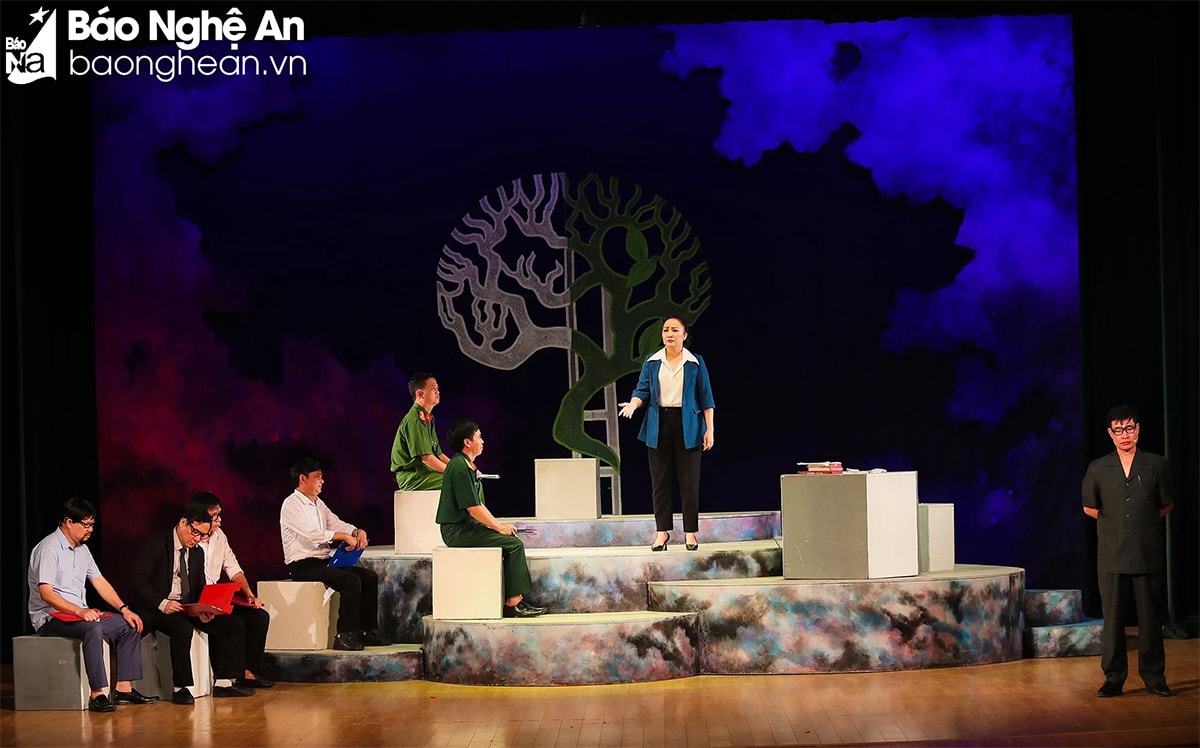
Thinking about that difficult time, Hong Luu still choked up as if it had happened yesterday. She said that in the past, when performing, in addition to personal belongings, husband and wife also had to bring pots and pans, and wherever they went, they had to ask local people to make paste to mix flour for their children; wherever they went, the actors had to roll up their pants and shirts to do all kinds of hard work to have a satisfactory performance. Thinking back now, it was very difficult, but at that time, just thinking about being able to perform everywhere with their husband and children was already happiness.
After decades of hard work in acting, in 2012, Trinh Hong Luu was honored to be awarded the title of People's Artist by the President. Her "assets" are countless awards and medals, but she said that the most proud and happiest thing is the "award" in the hearts of the public. Hong Luu has roles that are "nailed" in the hearts of the audience such as the role of Mrs. Hoang Thi Loan in the play "Famous people grow up from the folk songs"; the role of comrade Nguyen Thi Minh Khai in the play "Sang mai niem tin"; the role of Nghe in the play "Co gai Song Lam"; the role of Nu in "Gia doi phai tra"...

To have the dossier of Nghe An Folk Song Heritage submitted to UNESCO, the Center for Preservation and Promotion of Nghe Tinh Folk Song Heritage has worked hard to collect fieldwork to create the film script "Nghe Tinh Vi and Giam Folk Songs - Voices from the Community". Needless to say all the hard work and dedication of Hong Luu in this journey, wherever there are traces of ancient folk songs, there are Hong Luu's footprints.
Every night, she and her brothers and sisters at the center diligently performed on stage; during the day, she took advantage of the time to visit the countryside, asking for the addresses of elderly artisans to chat and accumulate documents. She and her husband diligently traveled to the villages: Phu Luu, Nghi Xuan (Ha Tinh), Dong Van (Thanh Chuong)... to restore the performance of the conical hat troupe; went to Cam My, Cam Xuyen (Ha Tinh), Boi Son (Do Luong), Ngoc Son (Thanh Chuong)... along the Lam River to restore the performance of the fishing troupe; went to Yen Thanh and Dien Chau districts to restore the performance of the planting troupe...
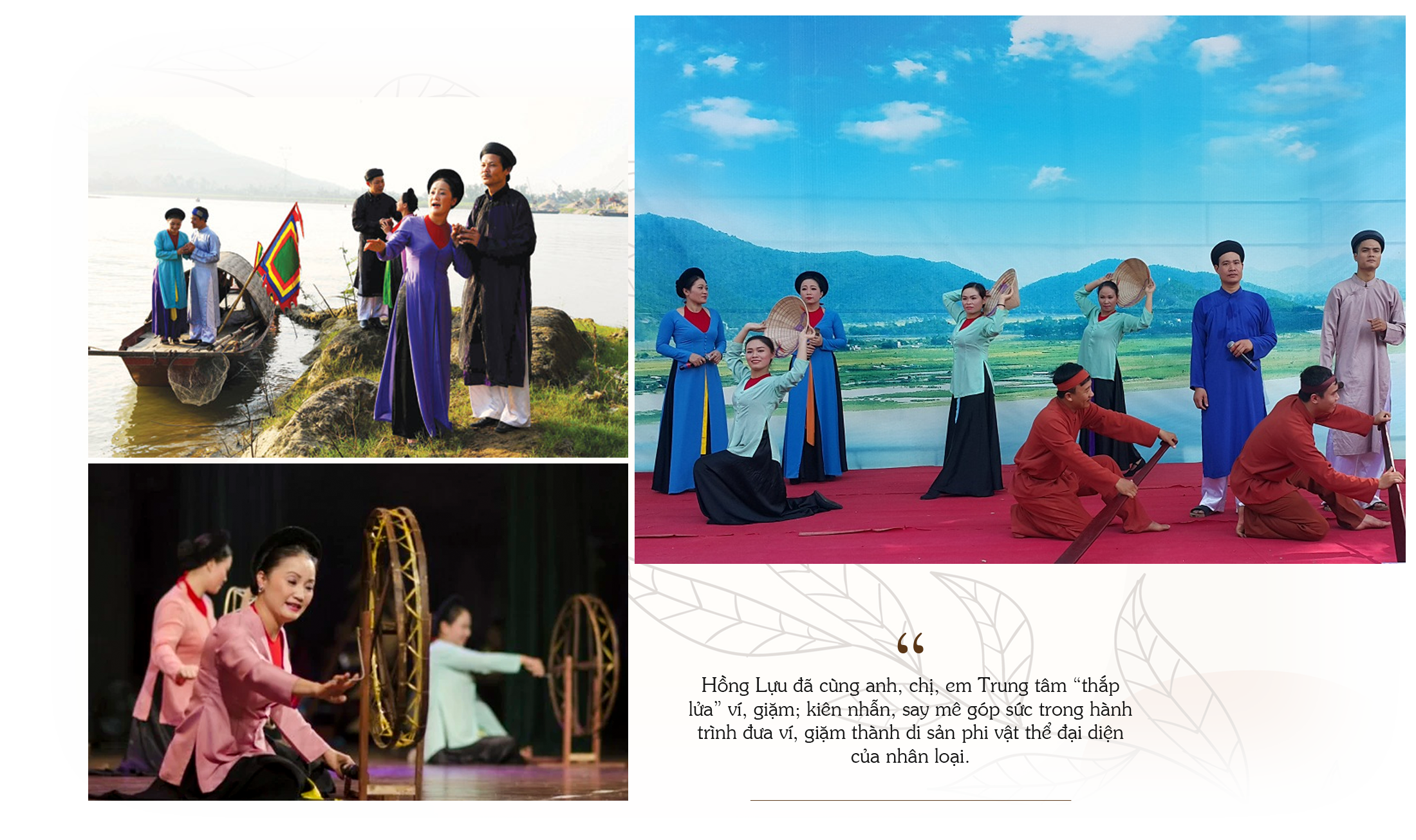
Since then, she and her husband - Meritorious Artist An Ninh have restored Nghe An folk songs. The first Vi and Giam performance that she researched and wrote a script for was "Duyen phuong vai". To create the script, she and Associate Professor Ninh Viet Giao went to the countryside, met with old artisans to learn, take notes, and collect documents. In the tireless journey, with the strong belief that Nghe An folk songs will have a solid position in the community and become a representative intangible cultural heritage of humanity, People's Artist Hong Luu and her colleagues have truly contributed to creating a thick, convincing dossier.
In 2020, the Nghe An Provincial Traditional Arts Center was established on the basis of merging the Center for Preservation and Promotion of Nghe An Folk Heritage and the Provincial Ethnic Song and Dance Troupe. People's Artist Hong Luu was appointed as Acting Director, then Director of the Center. In her managerial position, with her love and passion for folk songs, she and the Center's staff "lit the fire" of Vi and Giam; patiently and enthusiastically contributed to the journey of making Vi and Giam a representative intangible heritage of humanity.

Loving folk songs passionately, People's Artist Hong Luu always wants to learn, grow, try her hand at different roles, and contribute to the development of folk songs in many aspects. Besides her performing role, Hong Luu is also a director, participating in composing, editing, and adapting folk song scripts... Hong Luu is also famous as an artist who dares to speak, dares to do, dares to accept and overcome challenges of artistic creation. She is the one who breaks the mold of old performances such as the space of performing village pots on a modern dance background; "ordering" the choir "Hong Lam land legend" with ancient folk melodies on an Acapella background - a background of unaccompanied vocals... leaving many impressions in the hearts of the public. Hong Luu said: Folk songs are life, and life is moving, so we also need to make folk songs move like that. We need to preserve to promote, promote to preserve, and the new way of conveying folk songs is also for that reason.
During her years as Director of the Provincial Traditional Arts Center, the Center won 6 Gold Medals, including 3 Gold Medals for folk drama at national professional festivals and 2 Gold Medals for music and dance, and 1 Gold Medal for ASEAN music.
In 2023, People's Artist Hong Luu retired according to the regime, leaving her management role at the Provincial Traditional Arts Center, but her love and passion for folk songs still live strongly, urging her to continue to contribute in many different forms. Throughout her artistic journey, the most important thing that the female artist has learned is: Folk songs originate from the reality of life, and life is moving, so we need to make folk songs move like that. We need to preserve to promote, promote to preserve and the requirement is that the way to convey folk songs must be more innovative./.
